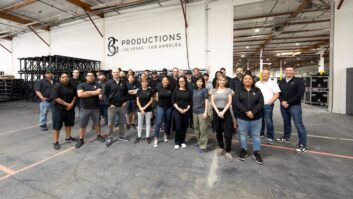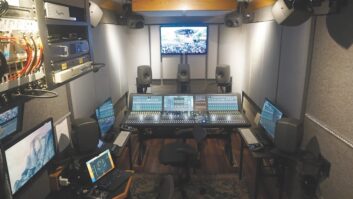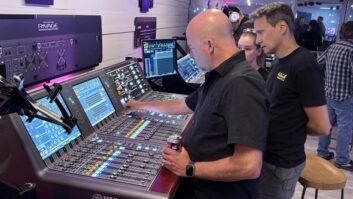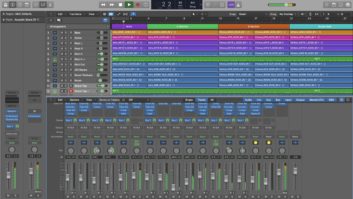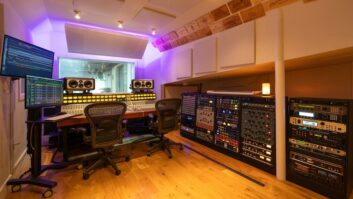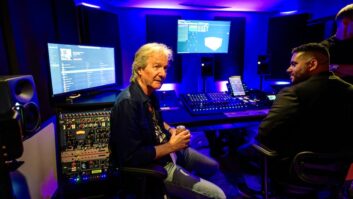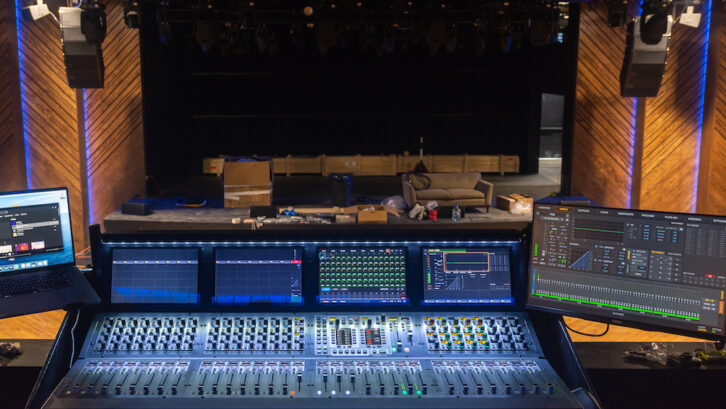
Back in 2015, as downtown Los Angeles was starting to reawaken, Michael Swier, co-founder of the Bowery Presents in Manhattan, took the opportunity to open his first West Coast venue, Teragram Ballroom, a 600-capacity space in the nearby Westlake neighborhood. Two years later, he launched his second L.A. venue, the 275-cap Moroccan Lounge. Now, Swier has thrown open the doors of the Bellwether, a 1,600-capacity, 45,000-plus-square-foot, multi-room complex right on the edge of downtown L.A.
While the origins of the building are lost in the mists of time, it has hosted a succession of nightclubs over the decades, most famously Prince’s Glam Slam West in the early 1990s. Swier and his team have reworked the previously derelict space to create a large, general admission, live music venue with a 270-degree wraparound balcony and wooden dance floor; a large, multi-use event space with separate outside access; a restaurant, lounge and bar with a small stage; a VIP room with private entrance; and an indoor patio area with one wall that opens onto views of the city.
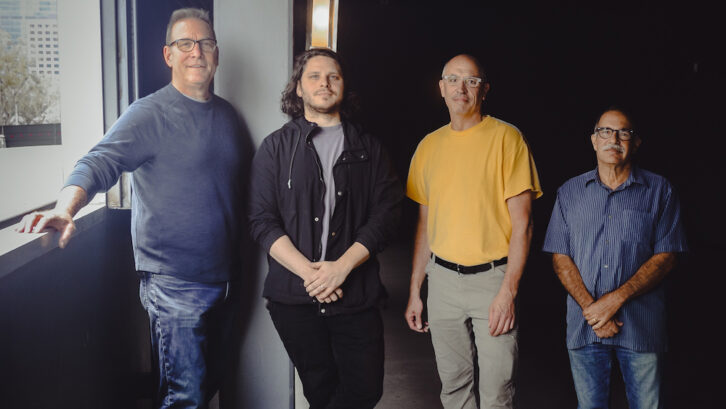
For this latest venture, Swier—co-founder and owner of New York’s Mercury Lounge, Bowery Ballroom, Music Hall of Williamsburg and Webster Hall, among others—has partnered with Gregg Perloff, co-founder and CEO of Bay Area independent concert promoter Another Planet Entertainment, which runs San Francisco’s Outside Lands, reportedly the largest independently operated festival in the U.S. Following opening night with Phantogram on July 11, the Bellwether’s busy calendar for August and September includes the likes of Santigold, Carly Rae Jepsen, Sudan Archives, Yo La Tengo and Wilco.
START WITH QUALITY SOUND
Swier’s venues reflect his philosophy that top-quality production technology, acoustics and staging are essential to the experience for the artist and audience alike, as he has repeatedly demonstrated since opening the Mercury Lounge in 1993. To that end, he once again called on Jeff Del Bello, president of New Jersey-based design, installation and sales company dB Sound Design, to handle audio and lighting design and integration at this newest location.
Del Bello has been installing d&b audiotechnik speakers in Bowery Presents venues since day one, but the Bellwether’s complement, from the main room to the event space to the lounge and the lobby, may be the largest collection yet. In the main room, Del Bello, assisted by dB Sound Design senior engineer Francis Valentine, installed an array of six d&b XSLi boxes on each side of the proscenium. Five KSLi-GSUB subwoofers have been set into the front of the stage. “I like to have one centered in the middle, so it’s always an odd number,” Del Bello says.
A pair of Yi10P out-fill boxes cover the balcony to either side, with another four providing stage lip fill. There are 10 M4 bi-amped wedge monitors available onstage. Everything is powered by 4-channel D40 class D amps.
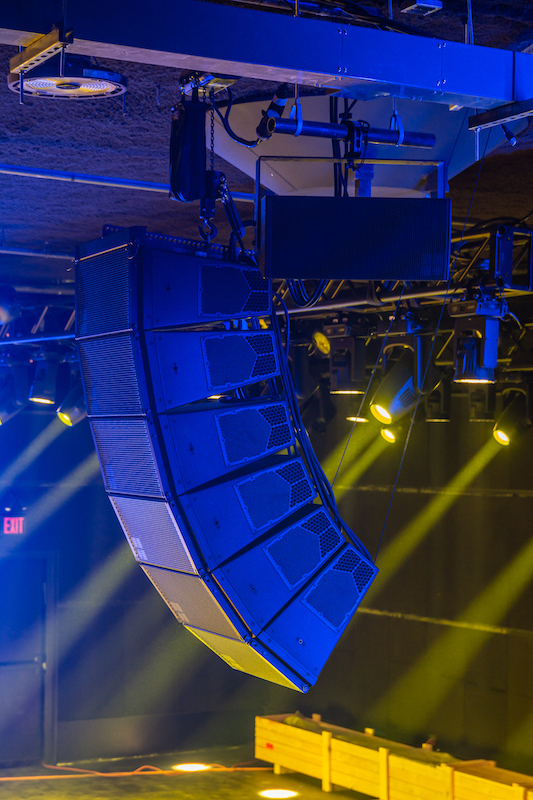
When d&b introduced the XSL Series a few years ago, the company touted its performance-to-size ratio, to which Del Bello enthusiastically attests. “This system will rip your head off; it’s crazy how powerful it is,” he says, “and it sounds really good. We fired it up, and with very little equalization, it was already in the ballpark.”
Swier admits that he initially turned tail and left as soon as he saw the four support pillars in the middle of the dance floor. Happily, his brother and business partner, Brian, an architect, developed a solution to remove the columns and provide unimpeded sightlines from anywhere in the room. “It was not an inexpensive fix,” says Michael Swier, “but a doable one,” involving the construction of a large support truss on the building’s roof parking area.
CONSOLE AND CONTROL
Previously, Del Bello would typically specify various digital or analog Soundcraft or Midas consoles at Swier’s venues but has since largely standardized on the more rider-friendly Avid platform. The Bellwether offers a 144-input Avid S6L 32D at FOH with a 112-input S6L 24C at the monitor position.
The FOH console and the lighting desk (dB Sound Design added lighting services five years ago) are in a crow’s nest, about 18 feet wide, that has been built onto the front of the balcony at the rear of the hall. If a tour is carrying its own desk, that’s no problem, says the venue’s production manager, Jon Zott, who has moved over from the Teragram, which is just a few blocks away. “So many people are bringing their own consoles, so I can move the Avid aside,” he says. The monitor mix position and amp racks are also on the balcony level in a room overlooking stage left.
Nowhere in the main hall is further than about 50 feet from downstage center, Zott reports, and the FOH mix position provides an accurate representation of the room. “We’re only talking about 21-foot ceilings, so it does translate really well. The subs translate fantastically well. It’s basically the same mix in the balcony as right in the center of the floor.”
MORE ROOMS, MORE SYSTEMS
The Bellwether’s event space is a flexible-use room that Del Bello has equipped with a dozen d&b 8S coaxial top/mid boxes on a grid, Bi6 subwoofers at the four corners, and a 21S infra-sub at each end. The amplifier model he preferred wasn’t available, so there are 16 individual cable runs from the d&b 5D amps, leaving the door open for a potential upgrade to an immersive setup, he says.
In the lounge, Del Bello has outfitted a small stage with d&b E12-D boxes, Bi6 subs and M6 stage monitors. There are two Midas M32 desks available, but the FOH console may yet be swapped out for the tablet-controlled rack version, he says.
A significant contribution to the main room’s performance, and a trademark of any of Swier’s venues, is that he always brings in an acoustician to add whatever treatments are necessary. At the Bellwether, acoustician Michael Panepento of Alabama Music and Audio Supervision has installed Owens Corning 703 broadband absorption along the front face of the entire balcony, together with drapes along the back and sides of the balcony level. The ballroom ceiling has also been sprayed with K-13 insulation (that sound-deadening fluffy finish you may have seen in parking garages).
Panepento additionally designed and installed wood paneling on either side of the stage. “It’s basically a Helmholtz-type design, a full-frequency diffuser and absorber,” he explains. “Whenever I use them, I get great results. Very few people will go to this length to do it, both acoustically and aesthetically, but I love the aesthetics and it does what it’s supposed to do; the room sounds really good.”
Zott agrees. In all his years of touring, he says, he has never encountered another similarly sized venue in the U.S. or Europe that sounds as good as the Bellwether. “You walk into this space, turn it on, and it’s like you’re listening to your monitors at home. I don’t know too many rooms with this capacity that feel and sound like a living room.”
